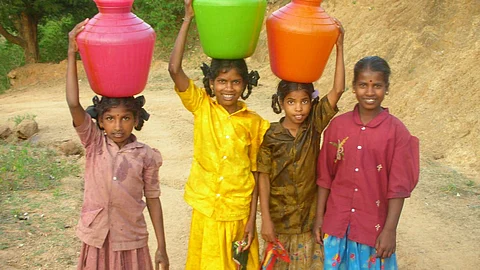
- Topics
- Feature
- Opportunities & Events
- About
- Hindi Portal
- Data
- Topics
- Feature
- Opportunities & Events
- About
- Hindi Portal
- Data

Researchers from Duke University in the US have recorded instances of uranium contamination in groundwater aquifers across 16 states in India. While the WHO has set a provisional safe drinking water standard of 30 micrograms of uranium per litre for India, the Bureau of Indian Standards’ drinking water specifications does not consider uranium as a contaminant to be monitored at all. While uranium contamination mostly tends to be geogenic, anthropogenic factors also have a major role to play.
Factors like the failure to improve air quality, cut greenhouse gas emissions and protect biodiversity have resulted in India being pushed to the bottom of the Global Environmental Performance Index this year. The country is ranked 177 out of a total of 180 countries in 2018. The data-driven State of India's Environment 2018 in Figures is a quantified statement which provides a clear picture of important environmental factors including water, air, sanitation, energy and forests.
Under its Southern Region Water Alliance project, the Confederation of Indian Industry (CII) has initiated the preparation of detailed project reports for restoring 31 waterbodies in Tamil Nadu. The project seeks to bring corporate companies together to plan and execute tank restoration works. While desilting and cleaning of the waterbodies will be the main activities, setting up benches and walking paths will also be taken up in a few cases. Funding for the projects is expected to come from the corporate social responsibility allocations of the member companies.
The Dakshina Kannada district administration has decided to go for a bathymetry survey to accurately assess the availability of sand for extraction from rivers in Coastal Regulation Zones (CRZ). The administration is expecting to get a baseline survey done as soon as the present sand extraction gets over by June 15. Permits for the next season in August will be issued after assessing sand deposition in riverbeds post-monsoon. Though sand mining in CRZ for commercial purposes is not allowed, the sand mafia continuously finds ways to circumvent rules.
In a bid to ensure supply of safe drinking water, the Punjab government has decided to install online water quality testing metres at inlet points of all rivers and canals in the state. The state water supply and sanitation ministry has called for expediting the process of mapping all canals and inlet points from where water is being extracted for drinking. This move is expected to help agencies treat raw water properly and remove dangerous toxic heavy metals wherever they are present before distributing for public use.
This is a roundup of important news published between June 5 and 11, 2018. Also, read policy matters this week.